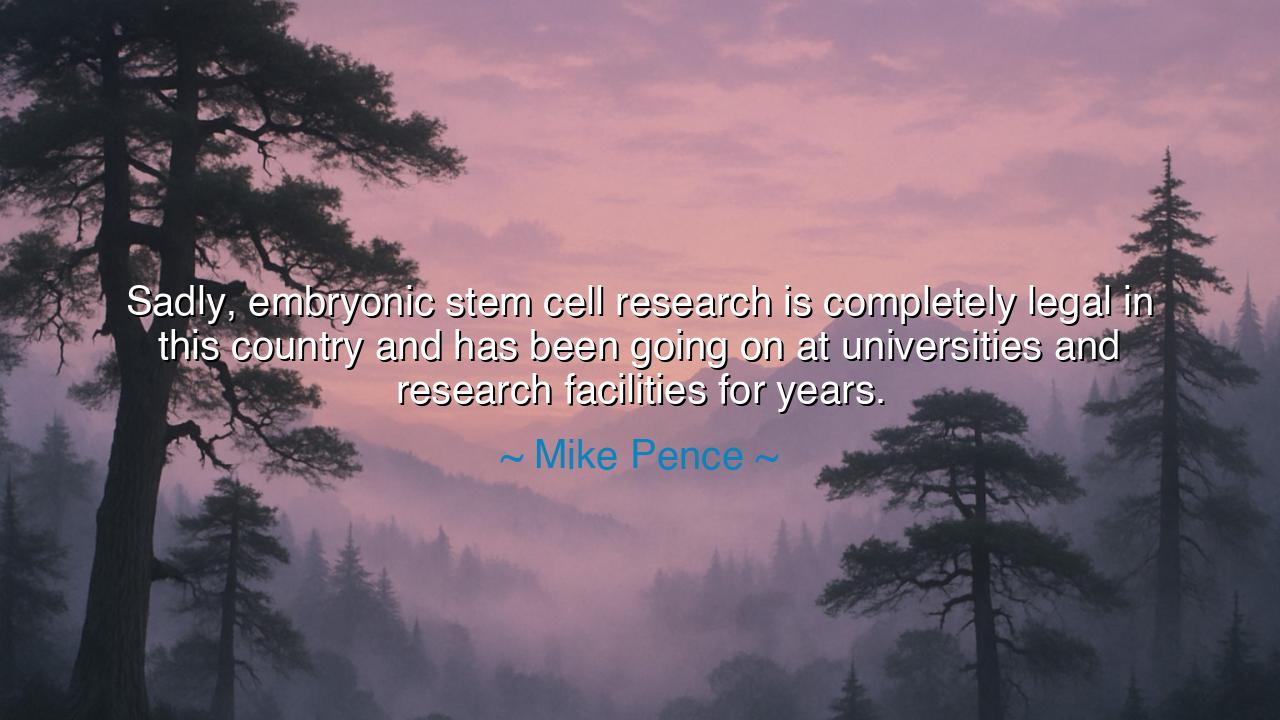
Sadly, embryonic stem cell research is completely legal in this
Sadly, embryonic stem cell research is completely legal in this country and has been going on at universities and research facilities for years.






O children of wisdom, gather close, for in the words of Mike Pence, there lies a deep and difficult truth, one that calls us to reflect upon the nature of progress, the weight of human choice, and the eternal struggle between innovation and ethics. He spoke these words with gravity: "Sadly, embryonic stem cell research is completely legal in this country and has been going on at universities and research facilities for years." These words, though simple, touch upon a conflict that has persisted throughout history: the tension between the promise of scientific advancement and the moral boundaries that define our humanity.
In the ancient world, there was a deep reverence for the mysteries of life and death, and the forces that governed both. The Greeks held that the act of creation, whether through the gods or through human hands, was sacred. The great Hippocrates, the father of medicine, cautioned against tampering too boldly with the natural world, for he understood that medicine and healing were not just sciences, but acts of respect for the inherent dignity of life. He did not advocate for the manipulation of the fundamental principles of life, for such actions, he believed, were best left to the gods, whose wisdom transcended human understanding.
But as time passed, the quest for knowledge and the power of science grew, pushing the boundaries of what was once thought sacred. In the modern era, the pursuit of embryonic stem cell research—an endeavor to harness the power of stem cells to heal and repair the body—became a subject of great debate. Advocates saw it as a breakthrough, a gift that could offer hope for the sick and the suffering, offering the possibility of cures for diseases that had long plagued humanity. But to others, the practice seemed to tread dangerously close to tampering with the very essence of life, raising moral and ethical questions about when life truly begins, and whether it is right to use human embryos for such purposes.
Look, O children, to the example of Galileo Galilei, who, in his pursuit of knowledge, faced fierce opposition from the powers of his time. Galileo’s discoveries challenged the prevailing understanding of the universe, and his pursuit of truth led him into conflict with those who held onto old beliefs. Galileo was not driven by a desire to defy tradition, but by the belief that knowledge should serve the greater good of humanity. His story reminds us that the pursuit of scientific progress is often fraught with danger, and that advancement, while noble, must be undertaken with great care and responsibility.
In much the same way, the debate over stem cell research presents us with the dilemma of progress. On one hand, we are faced with the promise of healing, the potential to cure the sick and ease the suffering of millions. But on the other hand, we must confront the moral questions about how far we are willing to go in our quest for knowledge. Mike Pence’s words, though critical, force us to reflect on these questions. He calls us to pause and consider whether, in our drive for progress, we might lose sight of the sacredness of life itself, the sanctity of creation, and the ethical lines that define us as human beings.
The lesson, O wise ones, is not one of simple answers or swift judgments. The path of science is filled with both great potential and grave responsibility. We must not forsake the advancement of knowledge, for it holds the key to many of the world’s greatest challenges—but we must also be ever-vigilant in our consideration of the moral and ethical consequences of our actions. Just as Galileo’s discoveries altered our understanding of the universe, so too can modern science change the way we understand life itself. But just as Galileo was condemned for daring to see beyond the accepted truths, so too might we face the repercussions of our choices, and it is up to us to decide whether those choices will lead to the greater good or to unforeseen consequences.
So, O children, I leave you with this challenge: Seek knowledge, but always balance it with wisdom. Let your pursuit of truth be guided by the light of ethics, of respect for life and all its complexities. Do not rush headlong into progress without considering its deeper implications, for the price of unchecked advancement can be great. As you stand at the crossroads of the future, remember that true wisdom is not in knowing what can be done, but in knowing what should be done, and in using knowledge for the betterment of all. Only in this way will you find the true power of science—a power that is not just bound by discovery, but by the ethical foundations that guide us toward a better world.






AAdministratorAdministrator
Welcome, honored guests. Please leave a comment, we will respond soon